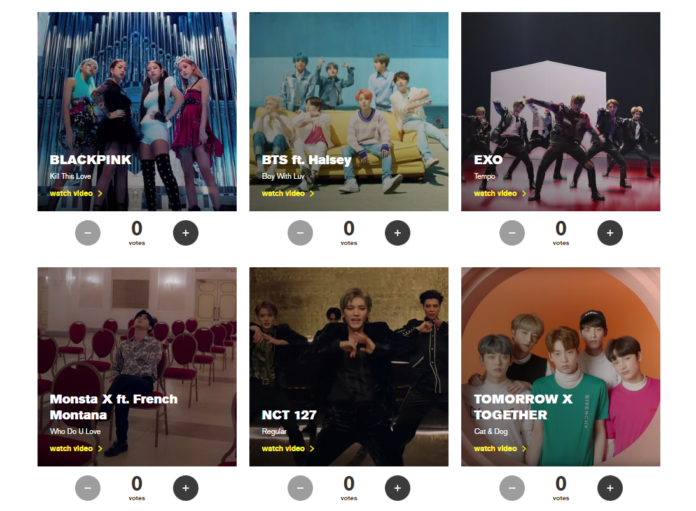K-pop should be in a category of its own, according to the MTV Video Music Awards (VMAs). MTV announced their new K-pop category during the 2019 VMA nominations on July 23. Bruce Gillmer, head of music and music talent at MTV International, says this was to “reflect the rich pop music landscape.” K-pop fans (especially BTS fans ARMY) were not buying it, trending #VMAsSoRacist within hours of the announcement. SHAAZIA EBRAHIM and FATIMA MOOSA break down why fans might be right.
The VMAs is an annual award show celebrating music video visuals. The categories and nominees are decided by a mysterious process: we know that MTV execs call the shots, but the rest isn’t as transparent. Then the fans get to participate. From July 23 until August 15, fans can vote on the VMA website and on social media. Voting for the Best New Artist category is open until the day the awards broadcasts. The 2019 VMAs will air on August 26 live from New Jersey’s Prudential Centre.
In the first ever K-pop category BTS, EXO, BLACKPINK, MONSTA X, NCT 127, and Tomorrow X Together have been nominated.
At first glance, the K-pop category might seem like recognition of the Korean pop music industry which has been taking the world by storm. According to the International Federation of the Phonographic Industry’s 2019 Global Music Report, the industry has experienced significant growth in the past year. The South Korean music industry has seen a 17.9% increase in revenue growth in 2018. The two artists credited with leading this growth are BTS and BLACKPINK. Both BTS “Boy With Luv” and BLACKPINK’s “Kill This Love” broke YouTube records for the most-watched video in 24 hours.
ARMY want the VMAs to put some respect on BTS’s name
BTS, arguably one of the most successful acts of 2019, have been nominated in three other categories. They’ve been nominated for Best Collaboration, Best Art Direction and Best Choreography. Four categories might seem like a lot but the group were overlooked in the major categories including Video of the Year (VOTY).
Nominations for VOTY went to 21 Savage and J. Cole for A Lot, Billie Eilish with Bad Guy, Ariana Grande’s thank u, next, Jonas Brothers Sucker, Lil Nas X and Billy Ray Cyrus with Old Town Road (Remix), and Taylor Swift’s You Need to Calm Down.
For the past 18 months, BTS have been racking up awards and decimating records. There are too many to go into but here are a few: first Korean act to debut an album at No. 1 on the US Billboard 200 chart, and to chart a single at No. 10 on the Billboard Hot 100. Matching a record held by The Beatles, their latest album — Map of the Soul: Persona — became BTS’ third-consecutive chart-topping album in the US in under a year.
Not only did BTS score a Grammy nomination in 2019, they were also invited to join the prestigious Recording Academy of Grammy voters. Their massive fan base ARMY bagged them some Guinness World Records, and they went on to be named in the Time 100.
By any standards, this reeks of success.
What about the other nominated K-pop acts?
BTS’ success aside, the rest of the acts nominated have reason to question the category. MONSTA X have been nominated for their song Who Do You Love?, a collaboration with French Montana. That shouldn’t be a problem as BTS’s Boy With Luv is also a collaboration with Halsey. But the entire MONSTA X song is in English, overlooking their earlier song Alligator which has a really cool video. Choosing Regular for NCT 127 and Tempo for EXO also seem like very odd choices, given both groups had greater successes with more recent songs Superhuman and Love Shot respectively. The nominations in the K-pop category make little sense and certainly need more transparency.
Five out of the six acts nominated have also toured America recently with the exception of EXO. This seems telling of why most of the acts were chosen for the category. It does not show any reflection of a “rich pop music landscape”. It just screams of laziness to properly celebrate the nuances of K-pop music.
As one fan pointed if the award show was serious about celebrating K-pop groups, they would have nominated more groups in the choreography category. If you’ve ever seen a K-pop music video or performance, you know that all K-pop groups have some of the best moves.
Many fans pointed out that it seems like the VMAs choose their nominees based on ethnicity rather than actual music success.
This is also not the only special category for a foreign language.
The Latin Pop category is dodgy as well
In 2010, the VMAs added the Latin Pop category to “honour” Latino artists. It’s no secret that Latin Pop songs have some of the most successful music videos.
The awards showed some disrespect to Luis Fonsi and Daddy Yankee’s Despacito. The video of the song is sitting on six odd billion views on YouTube and is the most-viewed video on YouTube ever. The Spanish song owned American summer charts in 2017. Despacito spent 16 weeks at number #1 on Billboard, tying it for most weeks at #1 with Mariah Carey and Boyz II Men for their 1995 song One Sweet Day and recently Old Town Road matched this record. The record-breaking video didn’t get recognition either.
But this is just one instance. The entire award show has a problematic history.
The VMAs problematic history
It’s not the first time the awards have been accused of being problematic. During the 2018 awards Beyoncé became the first-ever black artist to win VOTY for Formation. Nicki Minaj in 2015 called out the awards for leaving out her music video Anaconda from the nomination for VOTY and instead nominating it in the Hip-Hop categories. Taylor Swift was once again nominated for VOTY that year.
In 2016, M.I.A. accused the awards of “racism, sexism, classism, and elitism” after the VMAs glossed over her video for her self-directed video about the refugee crisis “Borders”.
That doesn’t even cover the problematic things that happened at previous award ceremonies. Remember when Miley Cyrus hosted the awards in 2015 in dreads? She also said “my real mammy” in a skit. Thats same year comedian Rebel Wilson mocked police brutality before announcing Best Hip-Hop Video, wearing a shirt that said “Fuck tha Stripper Police”. Yes, that really happened.
The rising irrelevance of US pop culture
The USA might be a giant in the music industry with its award shows and artists regarded as the “standard”. Yet if the rise of both Latin pop and K-pop in the US (and globally) in the past decades has shown us anything, it’s that America’s cultural influence is declining. By placing “foreign” artists into their own categories, mediocre (mostly white) American artists can still win in the top categories.
Then there’s the question of relevance. Less people are watching US award shows. The US music industry needs to capitalise on the popularity of Latin and Korean artists for the ratings and the clout. K-pop fan bases are some of the most engaged on social media, and can trend topics instantly. They also have massive power when it comes to voting for awards. When FIFA asked fans to vote for which song they wanted to play in the stadium during the 2018 World Cup Final. BTS and EXO outvoted all other fandoms on both Twitter and Instagram. (FIFA didn’t even play the songs.) Then there’s streaming.
With the rise in streaming culture, it’s become more difficult to award musical top honours. Asian streaming culture has particularly shocked America. (Read our piece of the drama that happened between Kris Wu and Ariane Grande in 2018). These days, fans can get their favs to top charts on every streaming app available from Spotify to YouTube and V-live using collective mobilisation on social media. And clearly, artists and their fans don’t need validation from increasingly irrelevant (and tone deaf) awards shows.









